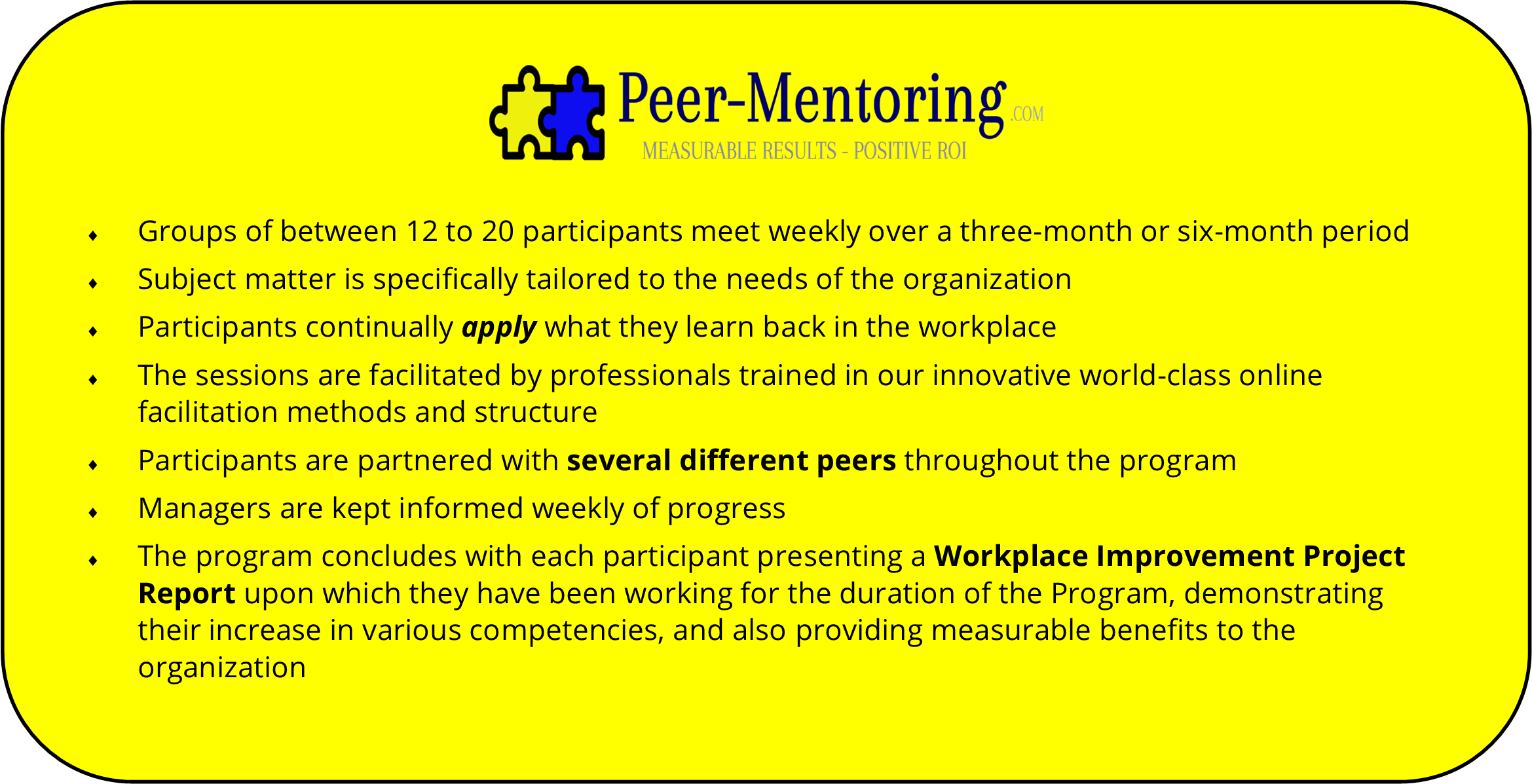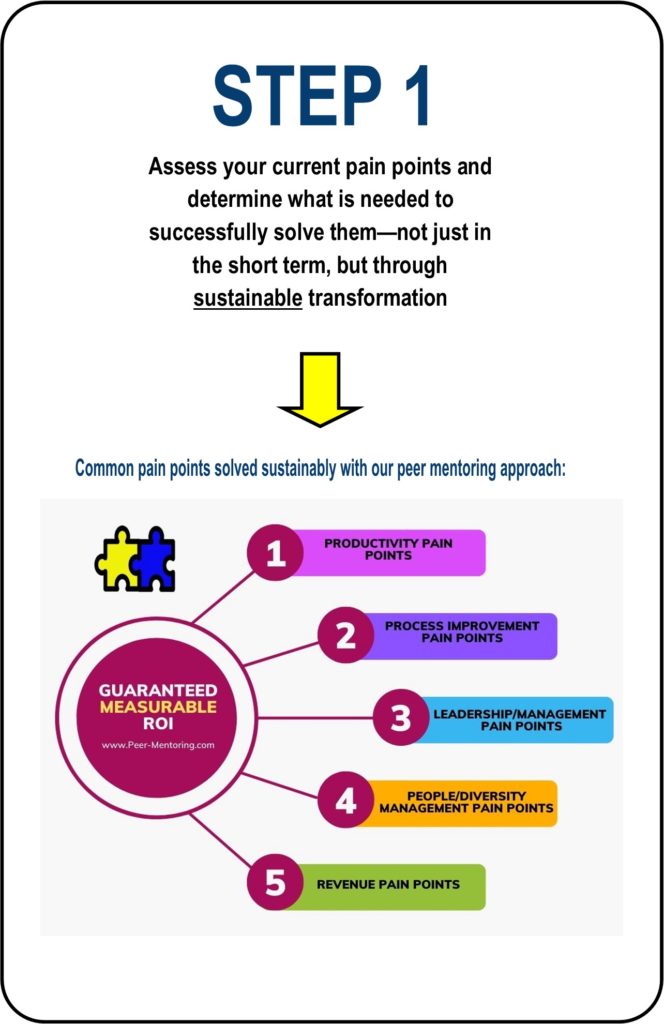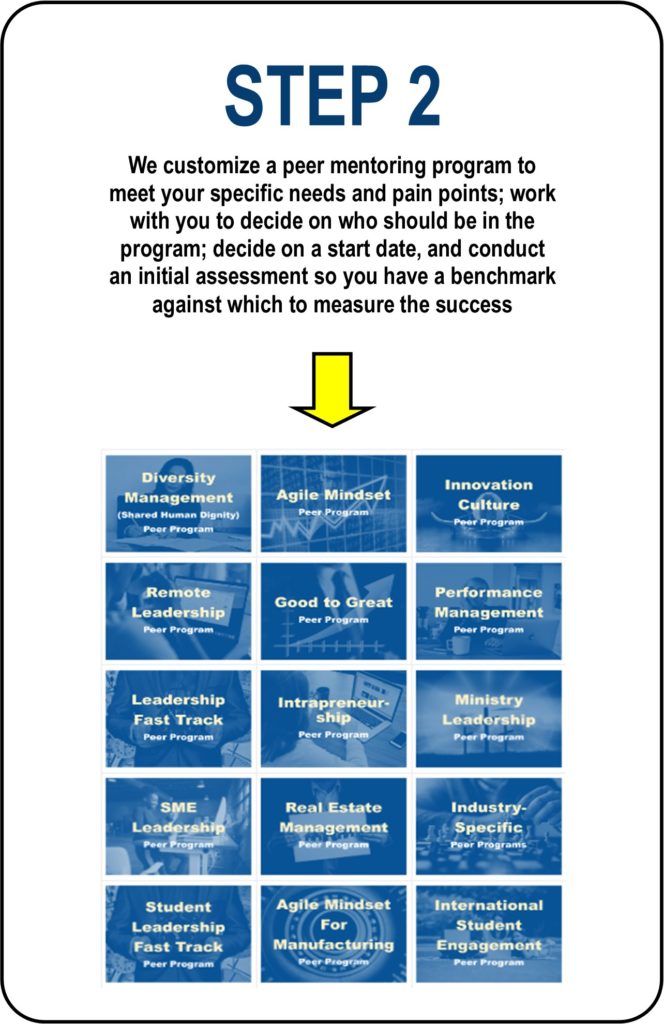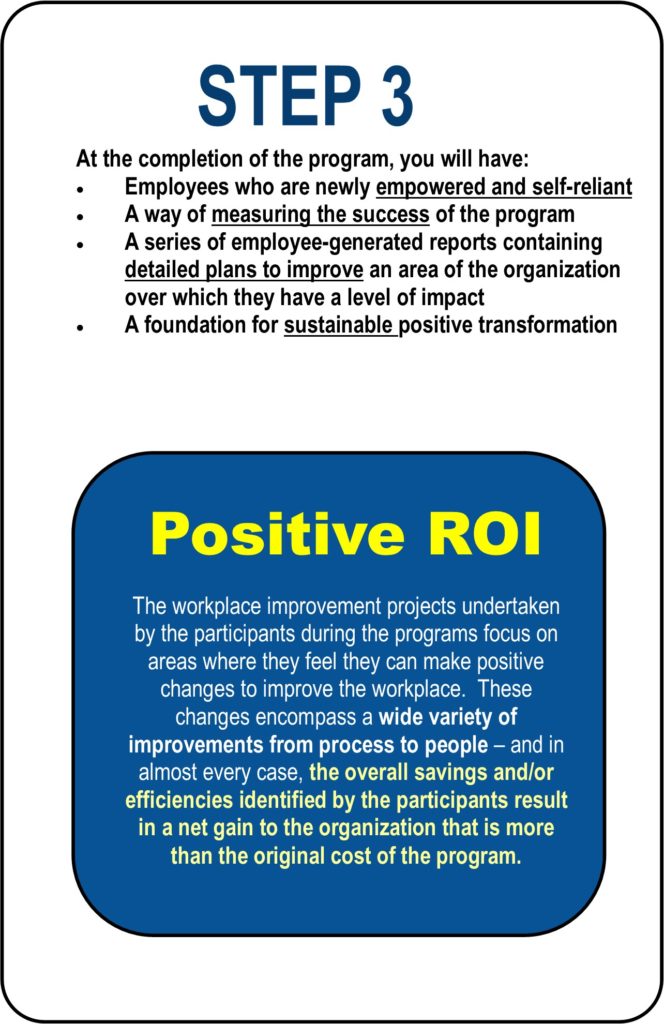Leadership Development with Measurable Results and Sustainable Change
Guaranteed!
“If you want to teach people a new way of thinking, don’t bother trying to teach them. Instead, give them a tool, the use of which will lead to new ways of thinking.”
Buckminster Fuller
AI-Enabled Leader Applied MBA
Peer Program
The Peer Mentoring Institute is proud to announce the release of the world’s first leadership program specifically designed to help leaders and managers navigate the rapidly evolving world of AI, AGI, and CHAT-GPT.
The ‘AI-Enabled Leader’ Applied MBA Peer Program includes an Applied MBA (where participants actually apply in their workplace what they are learning in the program), and provides participants with the tools and critical thinking skills necessary to succeed in an AI-driven world.
Contact us to discuss your situation and how we can design a Peer-Mentoring Program to address your specific challenges.
 PROBLEMS SOLVED:
PROBLEMS SOLVED:
|
|
…and more.

If your organization is facing any of the following leadership challenges, contact us to discover how specifically and strategically tailored and customized Peer-Mentoring programs can solve these issues, and more.
- Critical Thinking: With the rise of AI, it is now essential that organizations develop the critical thinking skills for framing questions, dissecting information, and exploring new avenues to communicate with each other, and with technology itself.
- Ability to Adapt to Change: Companies must be able to quickly and efficiently adapt to changes in the external environment so they can maintain their competitive edge. (Source: Harvard Business Review, “The Five Leadership Skills You’ll Need in 2023”)
- Data-Driven Decision Making: Data is a key to success in the 21st century and companies need to leverage the power of data to make informed decisions and remain competitive. (Source: McKinsey, “How Companies Can Prepare for the Data-Driven Future”)
- Difficulty Responding To Changes In The Market: Silo-based leadership structures are slow to respond to customer demands and opportunities, leading to delays in making necessary changes. (Source: CIO)
- Divergence From The Company Vision: Without clear lines of communication between departments, teams may become disconnected from the company’s overall vision and purpose. (Source: The Balance Careers)
- Diversity and Inclusion: To stay competitive, companies need to cultivate a diverse workplace which represents the different backgrounds and perspectives of its customer base in order to accommodate for the ever changing customer needs. However, this is challenging due to unconscious bias and other systemic issues. (Source: https://www.forbes.com/sites/nicolefisher/2018/06/20/commitment-to-diversity-and-inclusion-in-the-workplace-is-more-important-than-ever/#28670f3a7e1b)
- Embracing Automation: With the advancements in digital technology and artificial intelligence, large businesses are presented with the challenge of proactively embracing automation in order to stay competitive in the market. This involves not just implementing automation solutions but also adopting a digital-first culture which embraces change and innovation. (Source: https://deloitteinsights.com/us/en/topics/human-capital/connecting-employee-values-and-strategy-for-organizational-agility
- Fostering Culture of Innovation: Companies must foster an environment where innovation is nurtured and encouraged so that they can stay ahead of the competition. (Source: Gallup, “How Organizations Can Foster a Culture of Innovation”)
- Increased Risk Of Silo Mentality: Stagnant processes, lack of communication, turf wars, and low motivation levels are common issues with silo-based leadership structures, which can result in high levels of risk. (Source: McKinsey)
- Increasing Employee Engagement: According to a survey conducted by the Gallup organization, 71% of employees are not engaged at the workplace, leading to decreased productivity and overall morale. Furthermore, employee engagement strategies such as flexible working schedules and goal-setting initiatives can be difficult to implement in large businesses due to their hierarchical structure. (Source: https://news.gallup.com/businessjournal/206353/state-employee-engagement.aspx)
- Lack of Innovation: As information does not flow easily between silos, large companies may struggle to develop new products and ideas, leading to a lack of innovation. (Source: https://www.strategiesgroup.net/silo-based-leadership-challenges/). Siloed structures can also reduce the potential for innovative ideas to be shared and implemented within the organization. (Source: Harvard Business Review)
- Lost Opportunities: As different silos don’t always communicate with one another they cannot always recognize opportunities that might benefit the whole organization. (Source: https://hbr.org/2016/01/how-to-tackle-the-silo-problem)
- Managing Cross-Generational Teams: https://www.forbes.com/sites/forbescoachescouncil/2019/08/20/managing-cross-generational-teams-how-leadership-can-bridge-the-gap/#7e48cf9a38da
- Missing Out On Cross-Functional Collaboration Opportunities: Siloed structures can limit collaboration across departments and ultimately lead to missed opportunities. (Source: Harvard Business Review)
- Poor Communication: As different silos don’t often communicate with one another, large companies may struggle to share information and strategies that would benefit the organization as a whole. (Source: https://www.strategiesgroup.net/silo-based-leadership-challenges/)
- Poor Decision-Making: An inability to coordinate decisions between departments can lead to poor use of resources and money. (Source: McKinsey)
- Reduced Customer Satisfaction: Poor communication between departments can lead to decreased customer satisfaction and increased support costs.
- Reduced Efficiency: As silos operate independently, this can lead to a lack of standardization across the company, and a lack of efficiency due to duplication of tasks or efforts. (Source: https://hbr.org/2016/01/how-to-tackle-the-silo-problem)
- Risk Aversion Culture: Stanford Graduate School of Business, 2018
- Talent Retention: With continued advances in technology, companies need to ensure that they keep their best talent. Companies must develop strategies for retaining their employees and enabling them to grow. (Source: Forbes, “The Top 10 Leadership Issues Facing Companies in 2023”)
- Unclear Strategic Alignment: As silos remain separate and don’t necessarily have to be aligned with the goals of the organization, it can lead to a lack of clarity when setting strategy. (Source: https://www.strategiesgroup.net/silo-based-leadership-challenges/)
Positive ROI
The workplace improvement projects undertaken by the participants during the programs focus on areas where they feel they can make positive changes to improve the workplace. These changes encompass a wide variety of improvements from process to people – and in almost every case, the overall savings and/or efficiencies identified by the participants result in a net gain to the organization that is more than the original cost of the program.
How the Peer Mentoring Institute model is different:
|
RESPECT and PROFITABILITY |
|
INNOVATION The Peer-Mentoring.com innovative programs combine world-class online facilitation techniques with an approach to learning whereby every element of the program is applied back in the workplace |
|
COLLABORATION Participants meet weekly (online) with both their group and with their peer-partner to discuss what they are learning, and how to apply it in their workplace. They also meet monthly with their manager to give and receive feedback on the application of what they are learning in the program |
|
PERFORMANCE Participants create a workplace improvement project during the program that is also based on increasing performance and/or efficiency in their workspace or department |
|
MEASURABLE RESULTS Various tools measure the results of the program – and in many instances, the workplace improvement projects alone provide a positive ROI, meaning the program results in savings that are more than the original cost of the program |
|
KNOWLEDGE TRANSFER Participants are partnered with Peer-Mentors during the life of the program to further enhance the learning experience and build the skills necessary to pass on their knowledge to others |
|
FEEDBACK Scheduled and structured feedback loops are part of the process with both their group, their peer-mentor, and their manager |
|
SUSTAINABLE CHANGE Participants are actively encouraged to share what they are learning with their team and direct reports, and in turn coach and mentor those reports to also apply the knowledge – thereby increasing the level of impact and positive sustainable change |
|
SMS SUPPORT
|
Together, these elements provide an innovative environment for both learning and application that result in:
- higher levels of engagement,
- increased application of skills and knowledge in the workplace, and
- positive sustainable growth.
An in-depth case study at Sun Microsystems found that:
- Employees who participated in a mentoring program were five times more likely to advance in pay grade, and mentors made even more progress.
- Mentees were promoted five times more than those not in the program, and mentors six times more.
- Retention rates were significantly higher for mentees (72%) and for mentors (69%) than for employees who did not participate (49%).
Peer-Mentoring.com solves the training dilemma
Over 71 percent of Fortune 500 companies offer mentoring programs [Source: Chronus Corporation], and this trend is continuing through high-performing organizations, with mentoring programs now becoming a standard in many workplaces.
How does it work?

We all know traditional training doesn’t provide sustainable positive change – it never really did… and now in the post-COVID world, training programs built on the old model, particularly those aimed at leadership development and sustainable change, simply no longer work… period.
BUT, it’s not just as simple as moving training online…
Seth Godin reported in an interview with Tim Ferriss that online classes have a 97% drop-off rate. He even reported that his own courses on Udemy and Skillshare have an 80% drop-off rate.
If we think about why people like going to school or college – and why they succeed – it’s rarely about what they learn. It is about the experience, the friends, the chance to connect, collaborate…
That collaborative approach and experience is just one of the elements the Peer-Mentoring programs include that most do not.
Another crucial element that is different in the Peer-Mentoring.com programs, is that we adopt an ‘agile mindset’ in the way we approach the training itself. The participants:
- cover a subject in the program,
- apply what they have learned in the workplace,
- and learn to respond to change with innovative thinking, in a flexible, transparent, and continually adaptive manner.
Guaranteed Measurable Results Leadership Programs
In the 3-month programs, this applied continual improvement becomes part of their routine… in the 6-month programs, this becomes part of the culture…
…and we GUARANTEE the results.
“We found 78% of our employees preferred to learn from their peers,” explains Mr Peter Butler, the head of learning at BT, the British telecommunications firm.
Continuing the discussion on Essential Leadership Skills and their relationship to Peer Mentoring, Tom Meloche and Mike Russell share two foundational truths for changing course based on evidence. These are essential skills for every leader to understand.
Guaranteed Measurable Results Leadership Skills Programs
The following video is a short discussion between CEO Mr Mike Russell and Accredited Program Facilitator Mr Chris Cooper about the benefits of the innovative peer mentoring programs.
Guaranteed Measurable Results Leadership Programs
THREE STEPS TO SUSTAINABLY
SOLVE ORGANIZATIONAL PAIN POINTS
Develop leaders who feel empowered, and who have the skills and knowledge to lead positive transformation:



Our Guiding Philosophy:
We ensure every participant receives an extraordinary experience, in an inspiring environment, where they discover how to be the best version of themselves, to achieve their own version of greatness, and how to apply what they learn back in the workplace
– and in their lives as a whole.

When combined with the training in leadership and management skills provided within the program, the addition of the peer-mentoring component provides participants with an opportunity to:
- Develop transferable and marketable coaching and mentoring skills
- Improve communication and interpersonal skills
- Brainstorm ideas and solutions
- Gain practical advice, encouragement and support
- Learn from the experiences of others
- Increase self-awareness, self-empowerment, and enhance personal growth
- Cultivate leadership, organizational and self-management skills
- Build networks
- Share experiences
- Practice coaching and mentoring skills
- Gain valuable insight into challenges and opportunities
- Develop and reinforce leadership and management qualities
Peer-Mentoring Programs
Click here for more information
Research, Studies, and Statistics
Click here for more information





